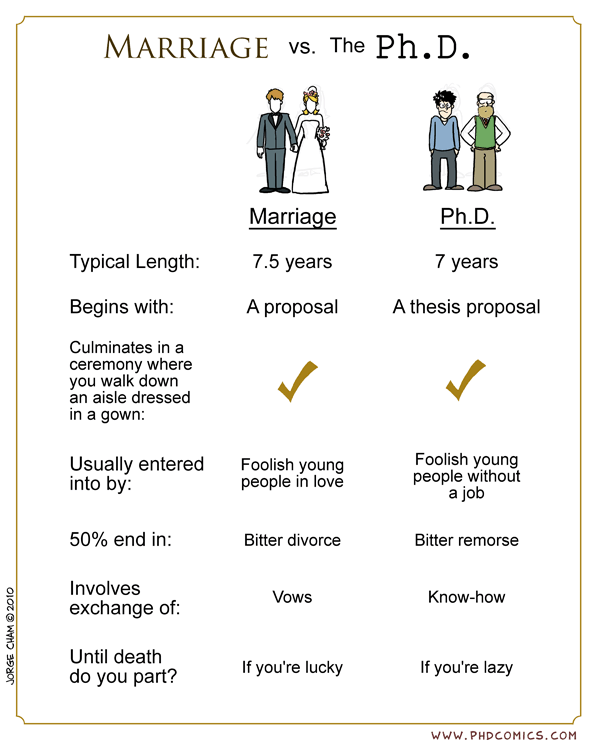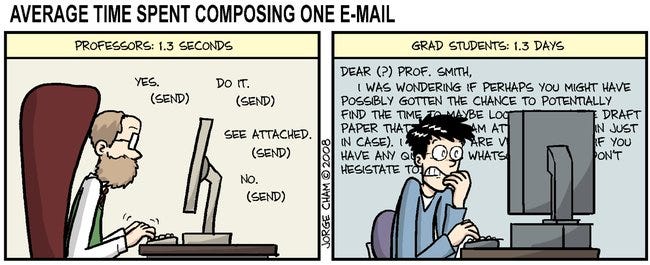What to Look for in a Potential PhD Advisor
Published:
“Is he ghosting me?”
“Is she mad at me? Did I say something wrong?”
“Am I good enough? Does s/he even recognize and appreciate what I’m doing?”
Although these sound like the thoughts of someone worried if their partner/spouse is mad at them, these are also the kinds of thoughts that PhD students riddled with Impostor Syndrome often have about their advisors/PIs.

This apparent similarity might seem strange at first sight, but there is often a deeper reality to it: a PhD advisor, and by extension the relationship that a student has with their advisor, has enormous influence over the graduate school experience of the student. Just as a romantic relationship requires effort, communication, honesty and integrity, so does the relationship with one’s PhD advisor.

The struggle is real
This shouldn’t come as a surprise, but doing a PhD is quite challenging, especially these days. Grad school application processes are notoriously expensive. Acceptance rates tend to average around 5-10% for STEM fields in the US, and can be low as 2–5% for some programs. International students have the added complication of getting a visa: in 2018, rejection rate for non-immigrant F-1 visa was around 35%. Once they’re in, graduate students world over are often not compensated well enough. In the face of ever-increasing cost of living, this leads to financial stress. Anxiety, stress, impostor syndrome, loneliness, concerns about the future, funding issues are only some of the all-too-familiar challenges that PhD students have to face on a daily basis; all while trying to do something completely new and original that no one in the world has ever done before! It is perhaps no wonder that PhD dropout rates in the US are as high as 50%.
Program structures and academic supervision also have a big role to play. Specifically, the relationship that you have with your advisor can greatly influence your PhD experience. The stories that I’ve listened to from my friends and colleagues over the past few years have made me realize exactly how bad things can get. Together with my own advisor struggles, these stories have given me a better perspective now on what it is that one should look for in a potential PhD advisor. This article is an attempt to give words to my thoughts on this subject — while my grad school experiences are still fresh in memory — in hopes that it will be useful to a prospective PhD student that is looking to find a thesis advisor.
The “Obvious”
1.1) Research Areas, Type of Work:
Assuming acceptance into a PhD program, the first “obvious” thing to look for in a potential advisor is their research interests. Often times, incoming PhD students already have a few research groups in mind before they join the program. This is good practice, but is far from sufficient.
Perhaps the best advice that I’ve received on this topic is from my current advisor, when I first met him before joining his group: look for what it is that you would do on a day-to-day basis and see if you find that exciting, rather than make a choice purely based on research topics. Are you an experimentalist and enjoy hands-on work? If so, would you want to do system-level work or are you more interested in device fabrication? Or are you more inclined to do computational or theoretical work? Asking these questions in addition to what area you want to work in can greatly help in deciding which research group to join.
1.2) Funding:
Funding for universities and scientific research is awfully lacking in many countries, and this is often reflected in the number of active researchers per million population. My own home country India, for instance, has only about 150 researchers per million. Availability of grant funds can vary from one field to another, but generally speaking, there isn’t enough to go around. I have known far too many of my own peers who have had to either TA (in addition to doing research) for multiple years on end, or switch groups because funds ran out. As a result, it is usually helpful to check with a potential advisor if they are willing to fund you for the entire duration of your PhD.
The Less Obvious (And underrated)
2.1) The Human Being:
Professors, especially the more popular ones, are some times made out to be larger-than-life figures who can do no wrong. The fact of the matter is that they are human beings, and have personalities and flaws just like everybody else. This might not matter to most people that interact with them, but it does to their PhD students.
A professor that I once worked with drew pleasure from needlessly ridiculing some of his students in front of other people. Another professor I knew would yell at his students as though they were his servants. The advisor of one of my friends is infamous for making his students spend many days on a report or a proposal, only to organize an 8 hour meeting soon after to rephrase everything the way he likes it. Another friend of mine has an advisor that has consistently given preferential treatment to one specific student in the group that she seemingly liked better. I could go on, but you get the point. In all of these cases, the personality of the advisor only affected their student(s), and no one else.
This is not to say that all advisors are bad people; in fact, in my experience, many are good people. But the point is, whether an advisor is a decent human being or not is often overlooked by many before they decide to work for him/her. Does s/he seem like a reasonable individual? Will they let you stay home if you fall sick, or will they expect you to come in no matter what? Do they seem like someone that would care for your mental health and your progress? These questions are important ones that both current and new graduate students must start asking.
As with toxic personal relationships, toxic professional relationships with PhD advisors are bad for students’ mental health. Suicide rates are high enough among PhD students as it is, and the last thing that you’d want as a first-year PhD student is to end up in an advisor situation that could make you regret your choice of doing a PhD. It is therefore a good idea to do your due diligence.
Some of this is hard to assess before joining a group, of course. But talking to current group members and asking the right questions can give you a good sense of things. This, of course, is still not a sufficient enough or a clear-cut enough solution, but it’s a good start. And if you somehow do hear something about what kind of a person s/he is, you would know to not neglect that information.
2.2) The Researcher:
Some researchers prioritize publishing as many papers as possible over all else, and go after quantity over quality. In my field, I have seen competitor groups that try to publish a new paper for every slightly-different result that they get in the lab. More often than not, this has made me desperate to get my work out as quickly as possible (in other words, prematurely). About a year ago, I insisted to my advisor that we submit some experimental observations that I made in the lab to a popular conference in my field. He said no. I persisted, and he still said no. He was not convinced that the data that I had collected was good enough to be published anywhere, despite my confidence in it.
The publication-starved graduate student in me was disappointed and a little heart-broken, but I later realized that he had taught me an important lesson about scientific integrity. (The data that I was so confident about later turned out to be not so reliable after all!) In my view, the kind of researcher that your advisor is will greatly shape what kind of researcher you will go on to be.
2.3) Willingness to Invest in You:
Time: There is some times a misconception among the general public that professorship can be a laid-back job, but most professors that I’ve interacted with are incredibly busy people. In addition to managing multiple research projects, students and postdocs, they are often shooting for new grants, teaching courses, are on various committees and also taking care of their kids and family. While part of their unavailability is therefore more than understandable, some advisors don’t end up making enough time for their students at all. Whether or not you actually get advice from your advisor on a regular basis is key to your growth as a researcher.
Resources: Would a potential advisor invest in your learning and training, or would they rather have you do only what matters for churning out papers? The whole point of a PhD is for you to learn about a subject in as much depth and breadth (in that order) as possible. It is therefore crucial that your advisor gives you the space and opportunities to learn and grow. This could mean anything from providing access to learning material to letting you attend summer schools and academic conferences.
Both of these are important aspects for a good learning experience, and it is a good idea to discuss them with current students of the advisor before making a decision.
2.4) Expectations and Communication:
New professors are often under pressure to publish at a faster pace to be able to keep their jobs. This usually means greater pressure on his/her graduate students to work harder. Older/tenured professors are a bit more “relaxed” in this regard. Neither is necessarily better than the other for a graduate student, but the potential workload and pressure is something to consider. Make sure you know what is expected of you before making the commitment, especially if you have other responsibilities (other jobs, kid(s) to take care of etc.).
Part of doing so is to be able to communicate with your advisor freely. For a long time, a friend of mine has had issues communicating her concerns with her advisor about sexist micro-aggressions directed at her by certain members of the group. The advisor was a woman too, which would ideally have meant that my friend should have felt safe to voice her concerns. But she didn’t. The reason there was simple: the advisor was far too detached from the individuals that made up the group, and communication between her and her students (especially my friend) was non-existent.
The moral of the story is that being able to communicate with your advisor freely about anything and everything is important, to say the least. To those that aren’t going through the PhD experience themselves, this might seem like asking for too much, but as any grad student that has suffered from issues such as this would tell you, communication matters.
Also “Obvious” (But overrated)
3.1) “Connections”/”Popularity”/h-index:
It could be tempting to readily join any “popular”/highly-published/well-connected professor’s group if they will have you, but this could prove counterproductive if you have not paid close enough attention to the more fundamental aspects that I’ve mentioned above. The professor that I mentioned before — the one that likes to ridicule his students needlessly in front of others — is extremely well-known in a worldwide scientific collaboration. He is one of the most brilliant people that I have ever met. But I would not want to do my PhD with him.
3.2) University Affiliation:
This is a popular one too. Wouldn’t it be “cooler” to introduce yourself as a PhD student at Harvard or Cornell rather than one at Florida State? It probably would, but that doesn’t necessarily mean that it is better. It is true that Harvard or Cornell might offer you a better overall student experience than some lesser-known universities (not that Florida State isn’t well-known), but there are so many more important things for a PhD. In addition to what I’ve already mentioned above, research environment in the department, access to research facilities and potential collaborators are much more crucial for a well-rounded research experience — irrespective of whether that is at an Ivy League school or some other. These factors are not relevant for undergraduate studies, but for graduate research, they most certainly are.
It is easy (and tempting) to fall into the illusion that h-indices and rankings matter a lot, but more often than not, that illusion breaks as quickly as it comes once the PhD grind begins. Working with a well-connected advisor at an Ivy League school surely has its benefits, but only if you are able to get the support that you need from them to be able to get through grad school in one piece.
The Bottomline
If there is anything that you take away from this article, I hope it is that there is more than what meets the eye when it comes to choosing a PhD advisor. Beyond what the numbers will tell you, the human being that your future advisor is is something that matters. Deciding to do a PhD is a huge commitment. Perhaps today more than ever, graduate students all over the world are facing increasing difficulties with financial compensation, stress, work-life balance and mental health. Having a supportive advisor by your side can greatly help make these 5–6 (hopefully not more) years a better experience.
Checking all of these boxes might not be possible for many. An advisor situation without any issues whatsoever might be even more unlikely. I certainly have had my own challenges and struggles in this regard. I’ve realized that some level of friction and some compromise is almost inevitable, and that that is not necessarily a result of you or your advisor not doing enough, but rather a reflection of the difficulty and complexity of undertaking scientific research. But by asking the right questions before (or even after) making the commitment, and by demanding what is only fair, we not only help our individual selves, but we also help build an environment where the needs of graduate students are better heard. And that, in my view, ultimately only strengthens academia and the scientific community at large.
I am incredibly grateful for the extremely considerate human being and the brilliant researcher that my advisor is — in that order. My hope is that you will be too, for your future advisor.

Needless to say, this article is neither “expert advice” nor “peer-reviewed”. But it was written with the hope that at least some of it will be useful. All this is is the inner thoughts of a 4th year PhD student that has hit multiple roadblocks on his research and is waiting for his advisor to respond to some of his emails.
“Is he ghosting me?”
This story was originally published by the author on Medium.
